A Dying Village And A Bucket Of Optimism
"You know, even now that I’m 80 years old, I still hope that things will get better."
Welcome to The Flâneurs Project. This post is part of our Mapping Romanian Places series. I am always delighted to interview people about the places they love and the places they long for. You can book a call here if you want to share your stories with me or if you simply want to connect.
“In a rural village in northwestern Romania, church bells ring ever more rarely and memories are the only refuge from loneliness. The few inhabitants are the last witnesses of a dying way of life, but their stories and experience reveal something universal” wrote Andrada Lăutaru in her essay Ode to a dying village.
I am in a dying village in northwestern Romania at the moment, as I write these words. The sky is covered in dark clouds, a gentle thunderstorm can be heard in the distance, and it has just started raining. The earth has a sweet, calming smell. The distant past seems to be at the touch of my fingertips.
If you read my previous post, To Have Met The Genius Loci, you might remember that I interviewed a villager in Giungi, my grandparents’ village, about her life in the village across the decades, from the 1940s until today. Eighty years of history, memories, and interactions with people, customs, and traditions. Before I share the interview I conducted with her below, I must confess how reassuring and soothing her optimism felt.
I entered her home curious to ask about her world, both physical and interior, as she’s one of those people who never left the village and has seen it through its communist past, through the changes of the ’90s, and now through its slow decline—or, dare I say, rebirth.
A spontaneous interview with Emilia Ghețe (known as Mica), on the 25th of June, 2024, in Giungi, Romania
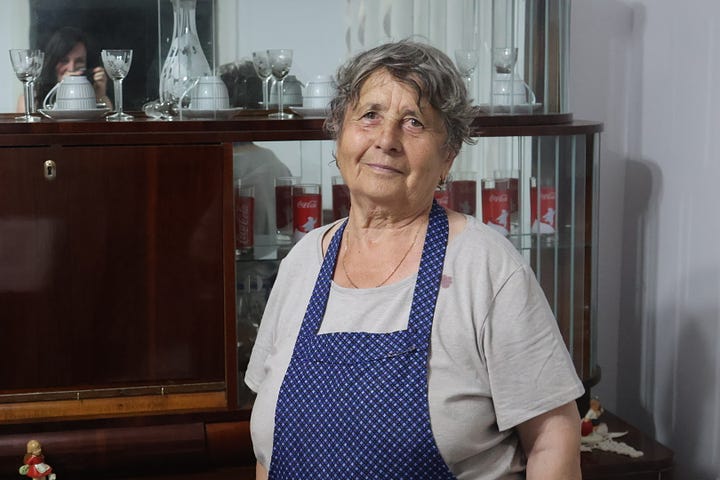
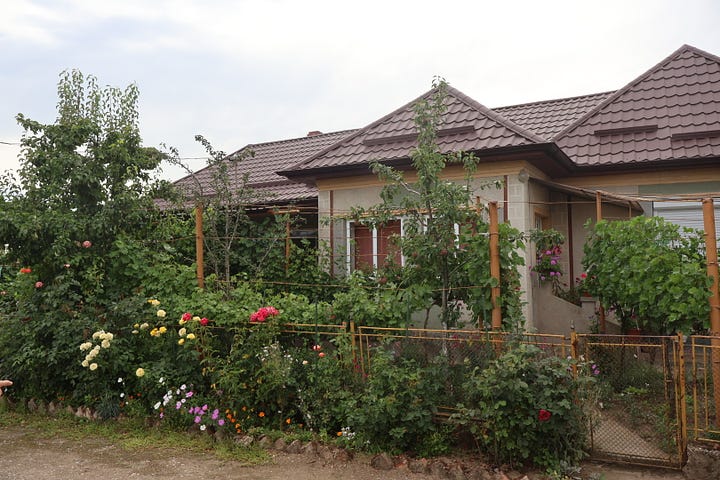
Mica is 80 years old and a widow. She was born and has lived in Giungi all her life.
Giungi
Mica: Patricia, I’ll answer what I know.
Patricia: Thank you. Have you traveled anywhere outside of Romania?
Mica: Apart from Giungi, Satu Mare, and Arad, nowhere.
Patricia: You’ve lived in Giungi for about 80 years, right?
Mica: 80 years, yes. I was born here, I got married here, I lived my life here.
Building
I handled everything. House, children, everything. But it was beautiful. Because I was young and didn’t notice any of it. It’s nothing. As I say, I was so eager for life.
Patricia: What is your favorite place in Giungi, the place you like the most?
Mica: When I was a child, of course, it was my parents’ house. And after that, my own house, because I built it. I made it from the foundation up.
Patricia: From the foundation up.
Mica: From the foundation up.
Patricia: And you built the house with your husband, right?
Mica: Yes, of course, of course. We had three children, the first girl died at birth. And then we had Lia two years after. Three years later, we had Sorin. And then we already started building. And it was hard because building a house, being pregnant, and working was tough.
My husband was away because of his job as a driver. I handled everything. House, children, everything. But it was beautiful. Because I was young and didn’t notice any of it. It’s nothing. As I say, I was so eager for life. I liked everything.
Optimism
You know, even now that I’m 80 years old, I still hope that things will get better.
Patricia: You are a very optimistic person. How come? Specifically, do you see things in life that others don’t?
Mica: You know, even now that I’m 80 years old, I still hope that things will get better. Even now at 80. When I was younger and something bad happened, it was nothing—it would pass, and things would get better. So, with this hope for life, I’ve lived my whole life. I never gave up. If I had difficulties, if I was sick, if my husband was paralyzed, or if something beat me down, I knew that God is good, and I would keep going.
Changes in the village
The houses were right next to each other. Someone lived in every house. Now, almost all the houses are empty.
Patricia: How do you think Giungi has changed in the past 50 years?
Mica: Well, it’s like heaven and earth. When we tried to come and build our house, as the old house started to fall apart, the village was full. The houses were right next to each other. Someone lived in every house. Now, almost all the houses are empty. Barely any elderly people, 80-year-old women, in Giungi. There are still some people. Not many, not many. But women in Giungi? There is one, but she is in Italy with her son. And one who doesn’t even come to church, poor thing, and me. That’s it. That’s it.
Patricia: And long ago, 40 - 50 years ago, how was the community? Did you all meet at church? Where else did you meet?
Mica: Gatherings and weddings. There were many people here.
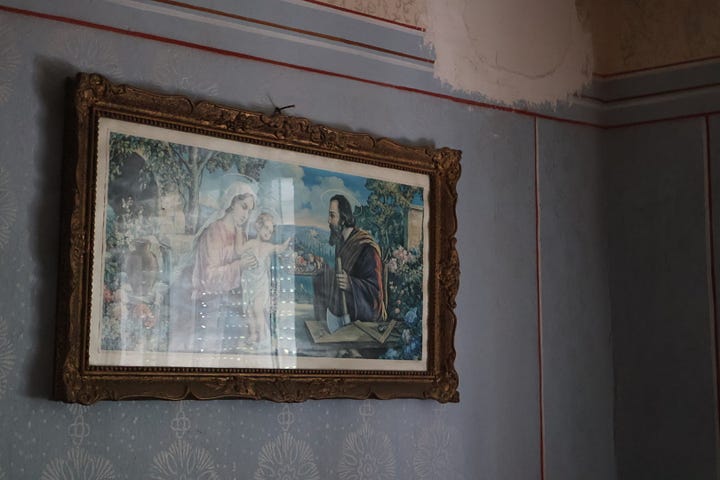
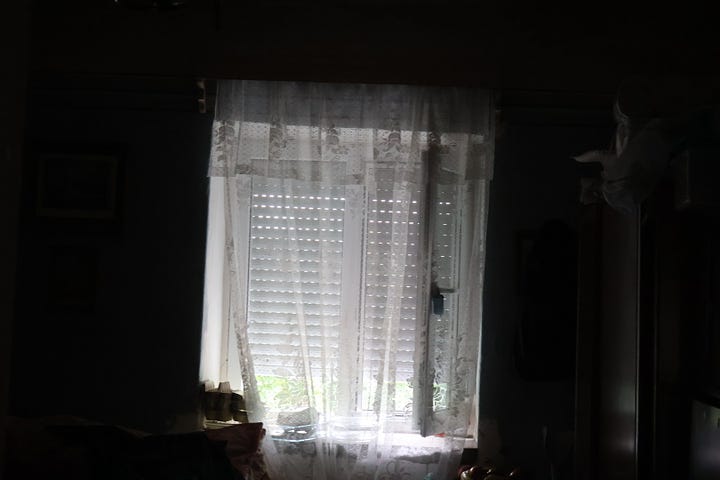
Matters of the land
Mica: Yes. And what I really want to tell you is that the world has changed so much, since that law came in. And since the land was given out. And the collectives were dismantled, and the land was distributed, and since then, relatives have started to argue among themselves over inheritance and land.
Patricia: Which law? From what year?
Mica: Well, from ’90. From ’90, so after… after the Revolution. Since then, people have started to argue, and parents no longer get along with their children and relatives. Only because of… land. Only because of land. Until then, no. There was friendship, but now, nothing. I don’t know why.
Travel
Nowhere, except here.
Patricia: If there were a place where you could simply go, just teleport yourself there. To arrive there in a second, anywhere in the world. Where would you go?
Mica: Nowhere, except here.
Patricia: Just here?
Mica: Just here. Just here. My peace. Many say they are afraid of being alone and a widow. I’m not, because I pray to God, and I close myself in the house, I lock the door and pray to God, and why should I be afraid? If you go to sleep with God, you wake up with God. I am not, I’m not afraid. I’m not afraid. I’m not afraid of the sun, of tomorrow, of anything. I just want health, that’s all. That’s what I ask from God. Health and peace!
After our brief and spontaneous interview, which I recorded on my phone, Mica gave me a tour of her house and garden. My eyes fell on her handwritten cake recipes scattered here and there, old Romanian books carefully placed near “bibelouri” (trinkets), and beautifully decorated pillows with Romanian motifs. I kindly asked her for a photo. She wanted to change her clothes, but I told her she looked lovely in her apron. Her eyes smiled. We then went to the garden, where she showed me the vineyard, the chickens, and the vegetables. She was most proud of her flowers.
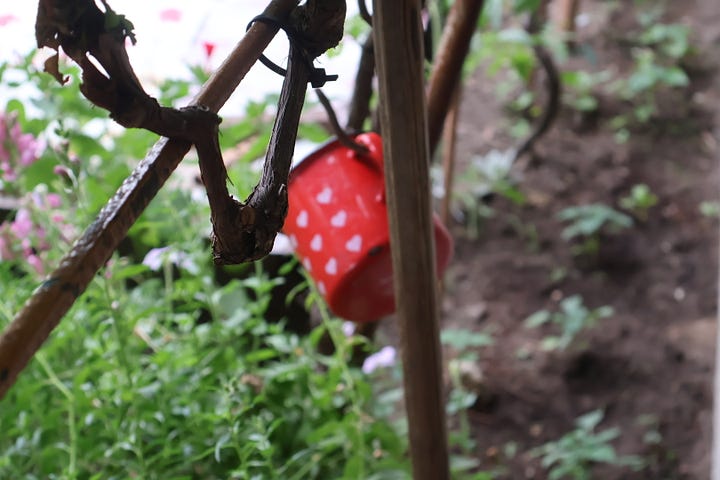
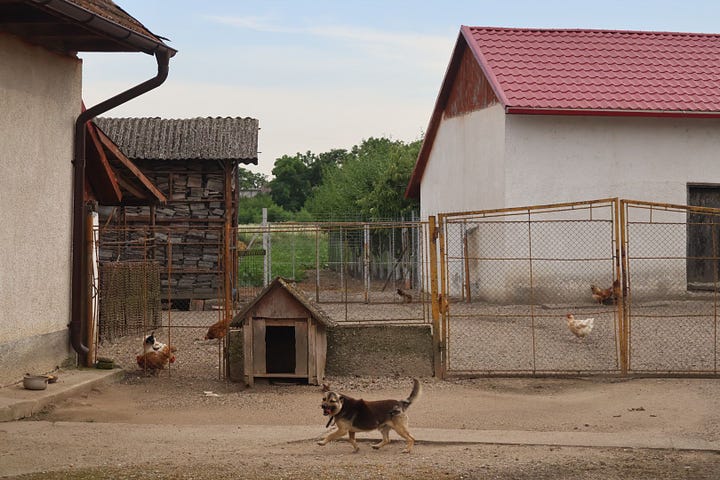
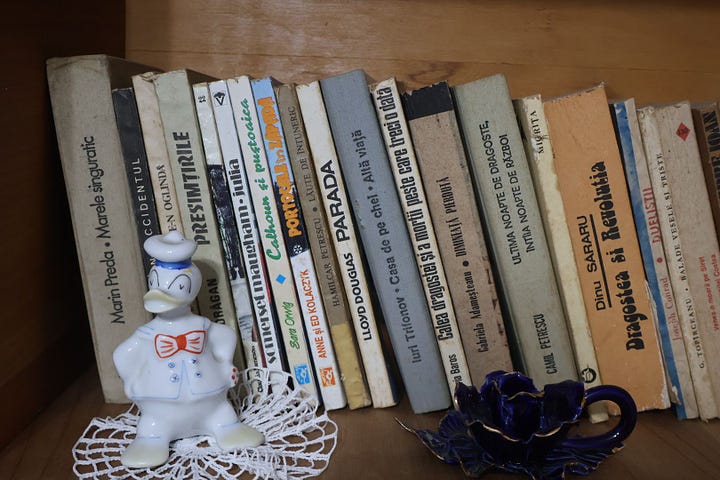
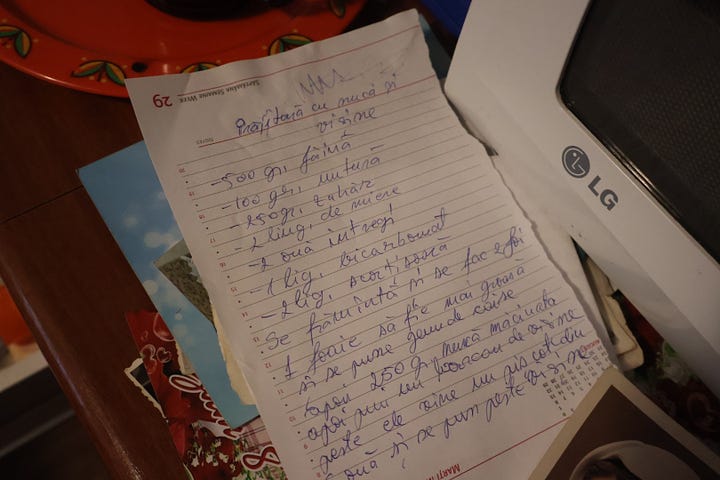
Rex, her small and very ferocious dog, was excitedly running through the yard as we explored every corner.
I left with some homemade berry pudding and a contagious sense of optimism. During many moments of our conversation, the past seemed to blend with the present. I was vividly remembering and reliving my childhood.
As we cannot retrieve an old world or the people who are now, unfortunately, forever gone, I think these are the greatest gifts a conversation has given me so far: long-forgotten comfort and pulsating hope.





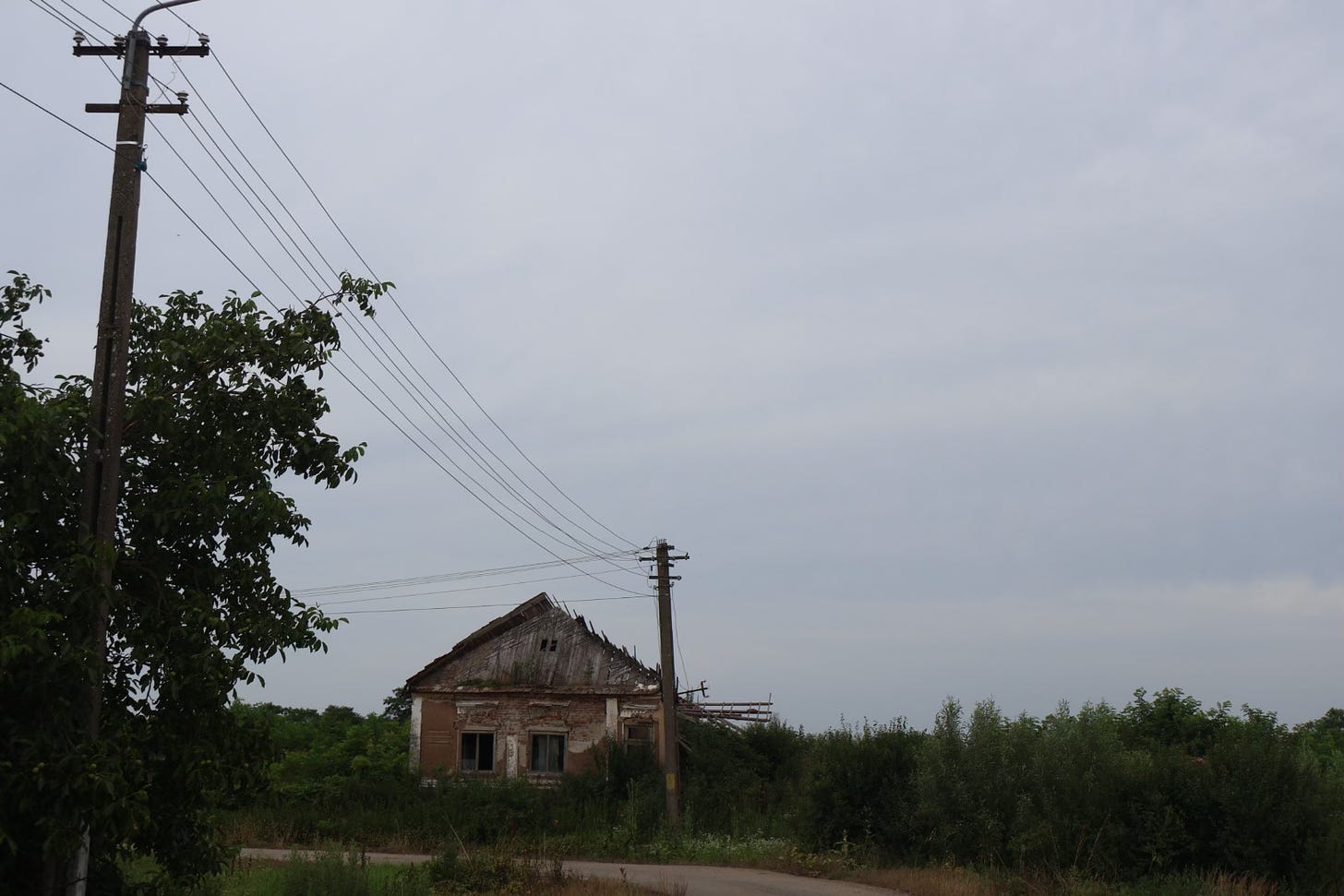

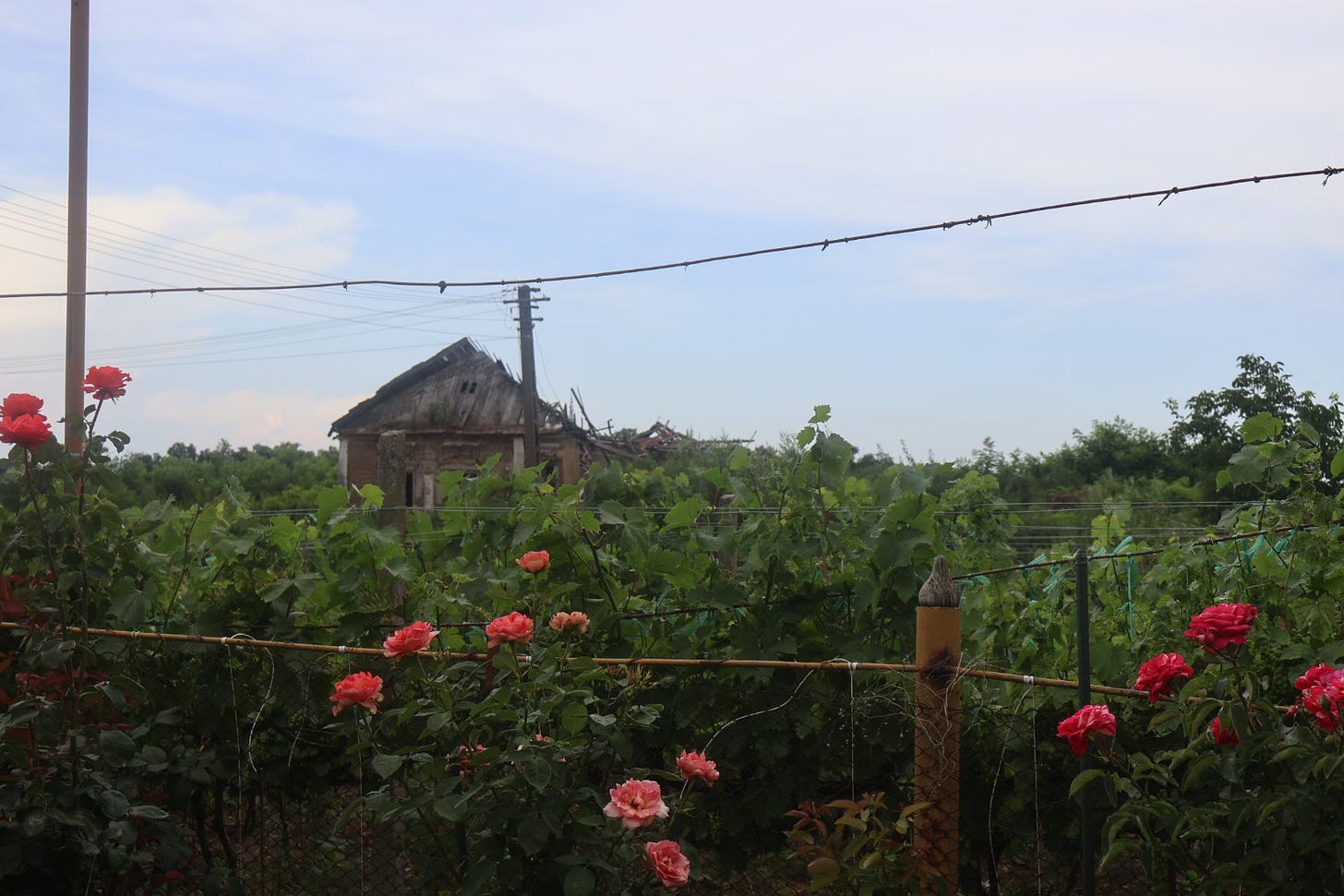
I LOVED this peak into another world, way of life, ways of seeing… beautiful all around. What a beautiful service you’re doing for the world, capturing these experiences and perspectives.
I also loved this interview. Such a different outlook and life experience from the people I know, all of whom have traveled a bit.